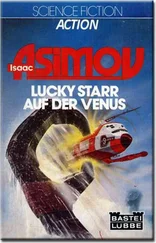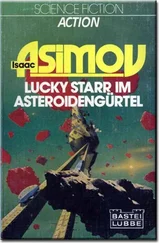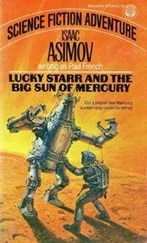Isaac Asimov - Lucky Starr The And The Moons of Jupiter
Здесь есть возможность читать онлайн «Isaac Asimov - Lucky Starr The And The Moons of Jupiter» весь текст электронной книги совершенно бесплатно (целиком полную версию без сокращений). В некоторых случаях можно слушать аудио, скачать через торрент в формате fb2 и присутствует краткое содержание. Год выпуска: 1984, ISBN: 1984, Издательство: Ballantine Books, Жанр: Фантастика и фэнтези, на английском языке. Описание произведения, (предисловие) а так же отзывы посетителей доступны на портале библиотеки ЛибКат.
- Название:Lucky Starr The And The Moons of Jupiter
- Автор:
- Издательство:Ballantine Books
- Жанр:
- Год:1984
- ISBN:SBN 0-345-31623-1
- Рейтинг книги:5 / 5. Голосов: 1
-
Избранное:Добавить в избранное
- Отзывы:
-
Ваша оценка:
- 100
- 1
- 2
- 3
- 4
- 5
Lucky Starr The And The Moons of Jupiter: краткое содержание, описание и аннотация
Предлагаем к чтению аннотацию, описание, краткое содержание или предисловие (зависит от того, что написал сам автор книги «Lucky Starr The And The Moons of Jupiter»). Если вы не нашли необходимую информацию о книге — напишите в комментариях, мы постараемся отыскать её.
Lucky Starr The And The Moons of Jupiter — читать онлайн бесплатно полную книгу (весь текст) целиком
Ниже представлен текст книги, разбитый по страницам. Система сохранения места последней прочитанной страницы, позволяет с удобством читать онлайн бесплатно книгу «Lucky Starr The And The Moons of Jupiter», без необходимости каждый раз заново искать на чём Вы остановились. Поставьте закладку, и сможете в любой момент перейти на страницу, на которой закончили чтение.
Интервал:
Закладка:
"That's all I want to know then," said Bigman heatedly. "If you cobbers can take a dog, you can take Lucky and me."
Commander Donahue was looking at his wristwatch impatiently. Now he put the palms of his hands flat on the table; and made as though to rise. "We have finished our business then, gentlemen."
"Not quite," Lucky said. "There's one little point to be cleared up. Bigman puts it crudely, but he's quite right. He and I will be on the Agrav ship when it leaves."
"No," said Commander Donahue. "Impossible."
"Is the added mass of two individuals too great for the ship to handle?"
Panner laughed. "We could move a mountain."
"Do you lack room then?"
The commander stared at Lucky in hard displeasure. "I will not give any reason. You are not being taken only because it is my decision that you not be taken. Is that clear?"
There was a glint of satisfaction in his eyes, and Lucky did not find it hard to guess that he was squaring accounts for the tongue-lashing Lucky had given him aboard the Lucky Starr.
Lucky said quietly, "You had better take us, Commander."
Donahue smiled sardonically. "Why? Am I to be relieved of duty at the orders of the Council of Science? You won't be able to communicate with Earth till I return, and after that they can relieve me of duty if they wish."
"I don't think you've thought it through, Commander," said Lucky. "They might relieve you of duty retroactive to this moment. In fact, I assure you they will do so. As far as the government records are concerned, then, it will appear that Agrav ship made its first flight not under your command but under the command, officially, of your successor, whoever he might be. The records of the trip might even be adjusted to show, officially, that you were not on board."
Commander Donahue went white. He rose and for a moment seemed on the point of throwing himself bodily at Lucky.
Lucky said, "Your decision, Commander?"
Donahue's voice was most unnatural when it finally came. "You may come."
Lucky spent the remainder of the day in the record rooms, studying the files on various men employed on the project, while Bigman, under Panner's guidance, was taken from laboratory to laboratory and through tremendous testing rooms.
It was only after the evening meal when they returned to quarters that they had a chance to be alone together. Lucky's silence then was not extraordinary, since the young councilman was never talkative at the best of times, but there was a small crease between his eyes that Bigman recognized as a sure sign of concern.
Bigman said, "We aren't making any progress, are we, Lucky?"
Lucky shook his head, "Nothing startling, I'll admit:"
He had brought a book-film with him from the project's library, and Bigman caught a flash of its title: Advanced Robotics. Methodically Lucky threaded the beginnings of the film through the viewer.
Bigman stirred restlessly. "Are you going to be all tied up with that film, Lucky?"
"I'm afraid so, Bigman."
"Do you mind then if I visit Norrich next door for company?"
"Go ahead." Lucky had the viewer over his eyes and he was leaning back, his arms crossed loosely across his chest.
Bigman closed the door and remained standing just outside for a moment, a little nervous. He should discuss this with Lucky first, he knew he should, and yet the temptation…
He told himself: I'm not going to do anything. I'll just check something. If I'm wrong, I'm wrong and why bother Lucky? But if it checks out, then I'll really have something to tell him.
The door opened at once when he rang, and there was Norrich, blind eyes fixed in the direction of the doorway, seated before a desk on which a checkerboard design carried odd figures.
He said, "Yes?"
"This is Bigman," said the little Martian.
"Bigman! Come in. Sit down. Is Councilman Starr with you?"
The door closed again, and Bigman looked about in the brightly lit room. His mouth tightened. "He's busy. But as for me, I'm filled up on Agrav today. Dr. Panner took me all over, only I don't understand a thing of it hardly."
Norrich smiled. "You're not exactly in a minority, but if you ignore the mathematics, some of it isn't too hard to understand."
"No? Mind explaining it then?" Bigman sat down in a large chair and bent to look under Norrich's workbench. Mutt lay there with his head between his fore-paws and one eye brightly fixed on Bigman.
(Keep him talking, thought Bigman. Keep him talking till I find a hole, or make one.)
"Look here," Norrich said. He held up one of the round counters he had been holding. "Gravity is a form of energy. An object- such as this piece I'm holding which is under the influence of a gravitational field but is not allowed to move is said to have potential energy. If I were to release the piece, that potential energy would be converted to motion-or kinetic energy, as it is called. Since it continues under the influence of the gravitational field as it falls, it falls faster and faster and faster." He dropped the counter at this point, and it fell.
"Until, splash," said Bigman. The counter hit the floor and rolled.
Norrich bent as though to retrieve it and then said, "Would you get it for me, Bigman? I'm not sure where it rolled."
Bigman suppressed his disappointment. He picked it up and returned it.
Norrich said, "Now until recently that was the only thing that could be done with potential energy: it could be converted into kinetic energy. Of course the kinetic energy could be used further. For instance, the falling water of Niagara Falls could be used to form electricity, but that's a different thing. In space, gravity results in motion and that ends it.
"Consider the Jovian system of moons. We're at Jupiter Nine, way out. Fifteen million miles out. With respect to Jupiter, we've got a tremendous quantity of potential energy. If we try to travel to Jupiter One, the satellite Io, which is only 285,000 miles from Jupiter, we are in a way, falling all those millions of miles. We pick up tremendous speeds which we must continually counteract by pushing in the opposite direction with a hyperatomic motor. It takes enormous energy. Then, if we miss our mark by a bit, we're in constant danger of continuing to fall, in which case there's only one place to go, and that's Jupiter-and Jupiter is instant death. Then, even if we land safely on lo, there's the problem of getting back to Jupiter Nine, which means lifting ourselves all those millions of miles against Jupiter's gravity. The amount of energy required to maneuver among Jupiter's moons is just prohibitive."
"And Agrav?" asked Bigman.
"Ah! Now that's a different thing. Once you use an Agrav converter, potential energy can be converted into forms of energy other than kinetic energy. In the Agrav corridor, for instance, the force of gravity in one direction is used to charge the gravitational field in the other direction as you fall. People falling in one direction provide the energy for people falling in the other. By bleeding off the energy that way, you yourself, while falling, need never speed up. You can fall at any velocity less than the natural falling velocity. You see?"
Bigman wasn't quite sure he did but he said, "Go on."
"In space it's different. There's no second gravitational field to shift the energy to. Instead, it is con-, verted to hyperatomic field energy and stored so. By doing this, a space ship can drop from Jupiter Nine to Io at any speed less than the natural falling speed without having to use any energy to decelerate. Virtually no energy is expended except in the final adjustment to Io's orbital speed. And safety is complete, since the ship is always under perfect control. Jupiter's gravity could be completely blanketed, if necessary.
Читать дальшеИнтервал:
Закладка:
Похожие книги на «Lucky Starr The And The Moons of Jupiter»
Представляем Вашему вниманию похожие книги на «Lucky Starr The And The Moons of Jupiter» списком для выбора. Мы отобрали схожую по названию и смыслу литературу в надежде предоставить читателям больше вариантов отыскать новые, интересные, ещё непрочитанные произведения.
Обсуждение, отзывы о книге «Lucky Starr The And The Moons of Jupiter» и просто собственные мнения читателей. Оставьте ваши комментарии, напишите, что Вы думаете о произведении, его смысле или главных героях. Укажите что конкретно понравилось, а что нет, и почему Вы так считаете.












